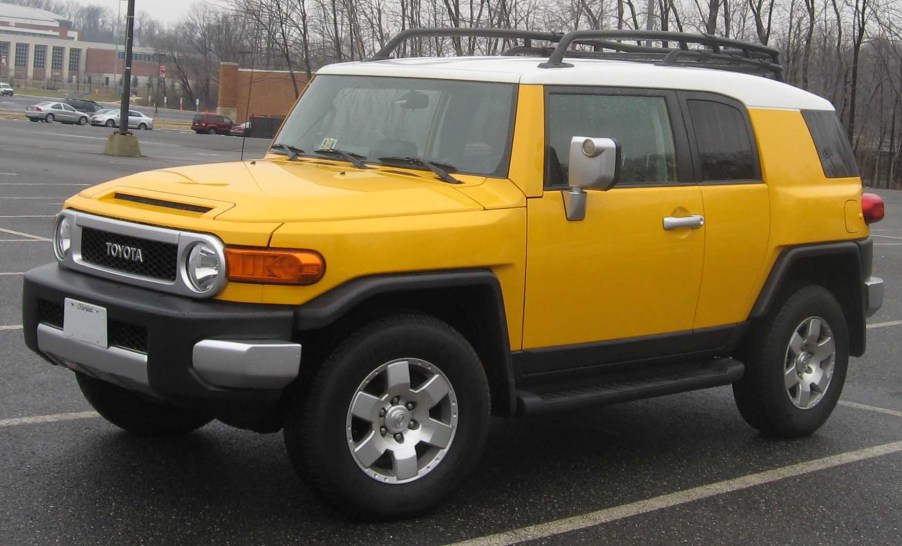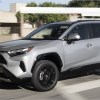
Discontinued SUVs That Should Return As EVs
Electric vehicles are taking over the automotive industry. Every automaker is announcing not only a new EV model but entire lineups coming in five to ten years. Plenty of these brands have discontinued SUVs that were loved, or weren’t, by previous owners. Some of them were so unique or cool that they’d fit in perfectly being revived as fully electric models. Here are some suggestions for discontinued SUVs that should return as electric vehicles.
Discontinued in 2016: Toyota FJ Cruiser

The Toyota FJ Cruiser has been discontinued for a few years, and it’s the perfect time to return. In light of recent events, automakers are aware of the demand for trucks and SUVs with off-road capability. Automakers like Ford and Subaru have gained off-road-focused trims for vehicles in their lineup to meet the demand of consumers all over America. Speaking of Ford, the Bronco is a great example of why the FJ Cruiser comeback would be so successful.
If Toyota can encapsulate the off-roading, no-roof-driving, fun aspects of the FJ Cruiser it could be wildly successful. Just as the Bronco has, it might even sell out everywhere for an extended period of time. FJ Cruisers are already highly sought after, and old ones sell for much more than they’re worth. A new, fresh, high-tech and fully electric FJ Cruiser would be exactly what the Toyota lineup needs. It would be a fresh face in the market and dominate the SUV segment.
Discontinued in 2015: Nissan Xterra

The Xterra was produced for about 15 years and sold pretty well as you might imagine. It was a truck-based compact SUV that prioritized ruggedness over luxury. Staying with the theme of the FJ Cruiser, Nissan’s previous SUV offering as an EV could be perfect for the current market. Taking a page out of the Wrangler and Bronco books, the Xterra could be the fully off-road capable vehicle Nissan needs. After all, it did give the Titan XD the Pro-4X trim specifically for that purpose. A Nissan Xterra Pro-4X EV has a nice ring to it.
Discontinued in 2009: Chrysler Aspen

The Chrysler Aspen was the Dodge Durango rebadged for Chrysler. Though the Durango performed much, much better sales-wise. The Aspen only lasted from 2007 to 2009 and was discontinued because of poor sales. Though the Aspen was the same as the Durango, it didn’t give the same feeling of high-performance owners get from Dodge products. If Chrysler’s Aspen were updated and given a powerful new GM Ultium battery, it could be the exact type of EV Chrysler needs to fill its gaps.
Steering away from the off-road capability, the Aspen transformed into a luxurious and spacious three-row EV SUV of the modern era could be a huge win for Chrysler. Competing with the likes of the Tesla Model X, Mercedes Benz EQ, and even the Rivian R1S would be difficult, but you have to start somewhere.
Discontinued in 1993: GMC Typhoon

We’re going back a little further than all the other choices to the early ’90’s GMC Typhoon. Over its barely three-year lifespan, only 4,697 of these vehicles were ever produced. It shared an engine with the GMC Syclone, one of the best performance pickup trucks ever produced. The Typhoon looked cool and moved fast, making it a very specific, but very likable choice for those who remember it.
A Typhoon EV would need to be completely redesigned from the ground up. The overall design of the original vehicle would not hold up well today. What would hold up is a “performance” SUV running completely on an electric battery, and from a brand like GMC. We already know General Motors is releasing tons of EVs over the next few years, so why not add a fast SUV to the list? The Typhoon could compete with the Tesla Model X Plaid for highest-performing SUV.
There’s no evidence to believe any of these vehicles will come to light in electric form. Though we’d love to see any, or all, of them, do so. With automakers like these moving into the EV space quickly, some may need an easy design decision to transfer to their EV lineup. The easiest way to go is bringing back old models, so why not any of these? They’re the discontinued SUVs we think should return as EVs.



